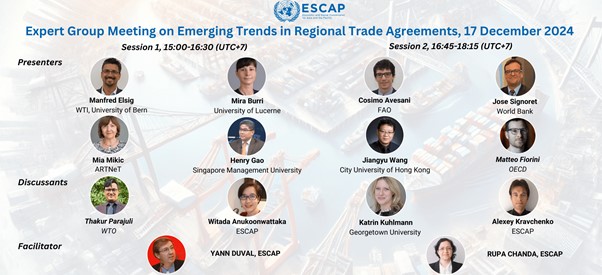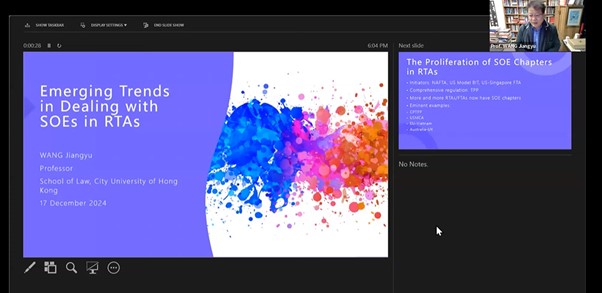Prof. Wang Jiangyu Delivers Expert Insights at UNESCAP Meeting on Regional Trade Agreements
17.12.2024
On December 17, 2024, Prof. Wang Jiangyu, Director of the Centre for Chinese and Comparative Law (CCCL), was prominently featured as an invited expert at the Expert Group Meeting on Emerging Trends in Regional Trade Agreements, hosted by the Economic and Social Commission for Asia and the Pacific (UNESCAP). This pivotal gathering convened leading authorities to examine the evolving landscape of regional trade agreements (RTAs).
During his presentation, Prof. Wang explored the intricate role of State-Owned Enterprises (SOEs) within RTAs. He noted the increasing trend of including specific SOE chapters in trade agreements, such as the comprehensive regulations found in the Trans-Pacific Partnership (TPP). These chapters often address non-discrimination, commercial considerations, and subsidy limitations.
Prof. Wang identified key emerging trends in SOE governance within RTAs, including broader scope, detailed provisions, competitive neutrality, promotion of good governance, and robust enforcement mechanisms. He underscored the necessity of multilateral cooperation for effectively managing SOE challenges within global trade frameworks.
He compared two key approaches to addressing SOEs in Free Trade Agreements (FTAs): the actor-based approach, exemplified by the Comprehensive and Progressive Agreement for Trans-Pacific Partnership (CPTPP), which establishes a unified legal framework with detailed and specific rules targeting SOEs as a distinct category of economic actors. This approach imposes obligations such as non-discrimination, commercial considerations, and transparency requirements to ensure competitive neutrality. In contrast, the action- or behavior-based approach, as seen in the Regional Comprehensive Economic Partnership (RCEP), focuses on regulating anti-competitive practices rather than targeting SOEs directly. This method emphasizes curbing behaviors that distort markets, such as unfair subsidies or preferential treatment, and provides more flexibility for participating countries in defining and managing their SOEs. Both approaches reflect differing priorities and levels of regulatory ambition in addressing the role of SOEs in global trade frameworks.
Prof. Wang highlighted several challenges in the current SOE discourse, such as limited country participation, the lack of a nuanced understanding of SOEs, and the absence of a systematic classification that supports differential treatment. These issues, he suggested, could affect the competitive edge of SOE exports.
To mitigate these challenges, Prof. Wang recommended enhancing international cooperation to better understand and regulate SOEs, advocating for the development of uniform rules and standards. He called for good corporate governance aligned with international best practices and stressed the importance of a balanced approach that respects market-based comparative advantages and fairness.
Professor Wang Jiangyu's participation in this conference was also highly significant for the Centre. Professor Wang's insightful speech enhanced the audience's understanding of China's influence on international economic policy and legal frameworks, underscoring the Centre's status as one of the most influential Chinese law and comparative law research institutions in the Asia-Pacific region, and highlighting its role in global dialogue. For further information about the event, please visit https://unescap.org/events/2024/expert-group-meeting-emerging-trends-regional-trade-agreements.




